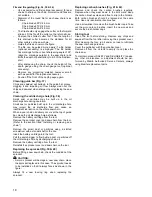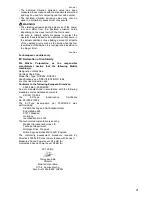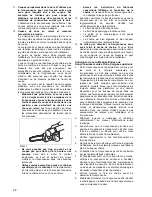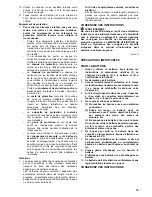
12
ENE090-1
Intended use
The tool is intended for cutting branches / pruning trees.
It is also suitable for tree service.
GEA010-1
General Power Tool Safety Warnings
WARNING Read all safety warnings and all
instructions.
Failure to follow the warnings and
instructions may result in electric shock, fire and/or
serious injury.
Save all warnings and instructions for future reference.
GEB118-1
Cordless Chain Saw Safety Warnings:
1.
Keep all parts of the body away from the saw
chain when the chain saw is operating. Before
you start the chain saw, make sure the saw chain
is not contacting anything.
A moment of
inattention while operating chain saws may cause
entanglement of your clothing or body with the saw
chain.
2.
When holding with both hands, always hold the
chain saw with your right hand on the rear
handle and your left hand on the front handle.
Holding the chain saw with a reversed hand
configuration increases the risk of personal injury
and should never be done.
3.
Hold the power tool by insulated gripping
surfaces only, because the saw chain may
contact hidden wiring.
Saw chains contacting a
“live” wire may make exposed metal parts of the
power tool “live” and could give the operator an
electric shock.
4.
Wear safety glasses and hearing protection.
Further protective equipment for head, hands,
legs and feet is recommended.
Adequate
protective clothing will reduce personal injury by
flying debris or accidental contact with the saw
chain.
5.
Always keep proper footing.
Slippery or unstable
surfaces may cause a loss of balance or control of
the chain saw.
6.
When cutting a limb that is under tension be
alert for spring back.
When the tension in the wood
fibers is released the spring loaded limb may strike
the operator and/or throw the chain saw out of
control.
7.
Use extreme caution when cutting brush and
saplings.
The slender material may catch the saw
chain and be whipped toward you or pull you off
balance.
8.
Carry the chain saw by the front handle with the
chain saw switched off and away from your
body. When transporting or storing the chain
saw always fit the guide bar cover.
Proper
handling of the chain saw will reduce the likelihood
of accidental contact with the moving saw chain.
9.
Follow instructions for lubricating, chain
tensioning and changing accessories.
Improperly
tensioned or lubricated chain may either break or
increase the chance for kickback.
10.
Keep handles dry, clean, and free from oil and
grease.
Greasy, oily handles are slippery causing
loss of control.
11.
Cut wood only. Do not use chain saw for
purposes not intended. For example: do not use
chain saw for cutting plastic, masonry or non-
wood building materials.
Use of the chain saw for
operations different than intended could result in a
hazardous situation.
12.
Causes and operator prevention of kickback:
Kickback may occur when the nose or tip of the
guide bar touches an object, or when the wood
closes in and pinches the saw chain in the cut.
Tip contact in some cases may cause a sudden
reverse reaction, kicking the guide bar up and back
towards the operator.
Pinching the saw chain along the top of the guide
bar may push the guide bar rapidly back towards the
operator.
Either of these reactions may cause you to lose con-
trol of the saw which could result in serious personal
injury. Do not rely exclusively upon the safety
devices built into your saw. As a chain saw user, you
should take several steps to keep your cutting jobs
free from accident or injury.
Kickback is the result of tool misuse and/or incorrect
operating procedures or conditions and can be
avoided by taking proper precautions as given
below:
• Use appropriate protection for foot-leg
and hand-arm.
• This saw is to be used by properly
trained operators only.
• Do not expose to rain.
• Maximum permissible cut length
• Direction of chain travel
• Saw chain oil adjustment
• Only for EU countries
Do not dispose of electric equipment or
battery pack together with household
waste material!
In observance of the European
Directives, on Waste Electric and
Electronic Equipment and Batteries and
Accumulators and Waste Batteries and
Accumulators and their implementation
in accordance with national laws,
electric equipment and batteries and
battery pack(s) that have reached the
end of their life must be collected
separately and returned to an
environmentally compatible recycling
facility.
Cd
Ni-MH
Li-ion













































